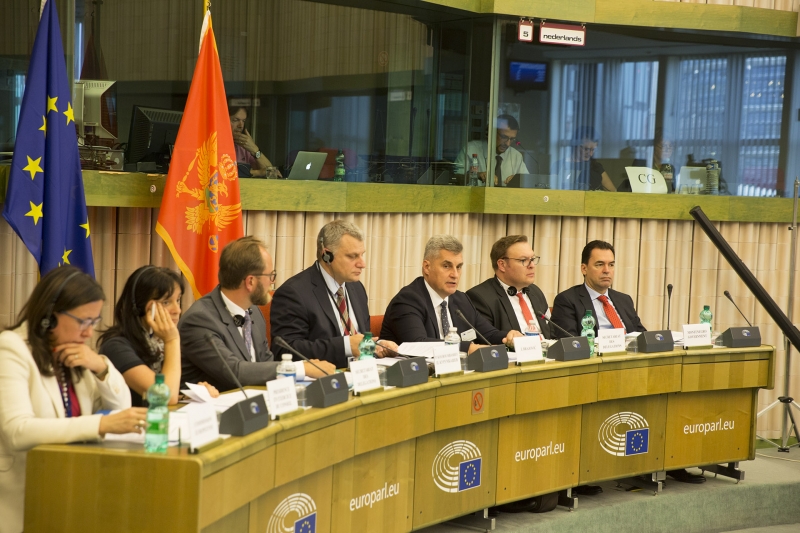Ms Genoveva Ruiz Calavera of the European Commission pointed out in her opening address that visible progress of Montenegro in many areas should be made stable and that it was important to emphasise that Montenegro was leading the Western Balkans on its path towards the EU and was recognised for its proactive neighbourhood policy. She also emphasised that the EU did not change its criteria, and that it still continued to rank countries in accordance with their individual achievements.
Under the item of the agenda relating to the implementation of parliamentary elections and the functioning of the Parliament, President of the Parliament of Montenegro and co-chair of the SAPC meeting Mr Ivan Brajović reminded that the elections of October 2016 were the first parliamentary elections where the electronic identification of voters was used, with very high voter turnout of 73,3%.
Mr Brajović also reminded that those were the elections observed by the highest number of international and domestic observers, who, in the ODIHR Final Report, assessed that “the parliamentary elections were organised in a peaceful and democratic spirit and in accordance with the reformed legislative framework”.
President Brajović said that, even though the opposition did not participate, the work of the Parliament went on regularly both in the domestic and international fields, and that currently there were no proposals for laws waiting to be adopted.
Deputy Prime Minister Mr Zoran Pažin presented concrete indicators in the fight against organised crime and high level corruption, with special emphasis on confiscation of property, prevention of money laundering, and fight against human trafficking.
In his address, Mr Miodrag Radunović presented numerous statistical data on activities in the field of social protection and employment policy, while Ms Daliborka Pejović dealt with the issue of protection of human rights, with emphasis on the rights of the child and domestic violence.
Mr Obrad Mišo Stanišić referenced the security issues and significance of our country’s membership in NATO, and voiced his expectation that Montenegro would be the first next member of the European Union, and Mr Adrijan Vuksanović stated his position that the integration success of Montenegro was to a large extent a consequence of commitment to regional cooperation.
In the Joint Statement, which was adopted at the end of SAPC, and which was signed by co-chairs Mr Peter Kouroumbashev, Deputy Head of the EU Delegation to SAPC, and President of the Parliament of Montenegro Mr Ivan Brajović, they welcomed Montenegro’s progress in the EU membership negotiation process, as well as Montenegro’s accession to NATO. It was noted that Montenegro was currently a candidate country which had made most progress and should become a member of the Union as soon as possible, as well as that the EU-Montenegro dialogue would have a positive spillover effect on the entire region.
The progress on reforms regarding the rule of law from Chapters 23 and 24 remained essential for the overall pace of the negotiating process, and the importance of accelerating reforms to tackle Montenegro’s key challenges in order to improve the living standard of its citizens was also pointed out.
They agreed that media freedom was the cornerstone of any democracy, and it was emphasised that Montenegro should effectively implement international and EU standards on human rights. It was also noted in the Joint Statement that by not participating the opposition missed an opportunity to discuss, with Members of the European Parliament, developments that led to the polarization of the political climate in Montenegro and the boycott of parliament following the October 2016 elections.
The co-chairs held a press conference where they summed up the conclusions from the Joint Statement.
Delegation of Montenegro, headed by President Mr Ivan Brajović, consisted of Vice President of the Parliament Mr Branimir Gvozdenović, MPs Mr Miodrag Radunović, Mr Tarzan Milošević, Mr Luigj Lubo Shkrela, Ms Daliborka Pejović, Mr Obrad Mišo Stanišić, Mr Nedžad Drešević, Mr Adrijan Vuksanović, as well as Deputy Prime Minister Mr Zoran Pažin, who had a speech on the topic of accession negotiations and relations between the EU and Montenegro.
EU-Montenegro Stabilisation and Association Parliamentary Committee (SAPC) was set up in June 2010, upon entering into force of the Stabilization and Association Agreement. The Committee is composed of Members of the Parliament of Montenegro and the European Parliament, and it meets twice a year interchangeably in Brussels or Strasbourg and Podgorica. SAPC considers all aspects of relations between the EU and Montenegro and, in particular, the implementation of the Stabilisation and Association Agreement.
VIDEO:
Press SAPC
Youtube: https://youtu.be/GuvA2QGSW7s
Cloud http://207.38.84.154/owncloud/index.php/s/7XeIy1LQWsYGKaO
Speech of President Brajović
Youtube: https://youtu.be/pVgkHVa6hiw
Cloud: http://207.38.84.154/owncloud/index.php/s/PX0GhZNbPS5Uqpu
SAPC cover footage
Youtube: https://youtu.be/1sx6HXIuKu0
Cloud http://207.38.84.154/owncloud/index.php/s/wiSGqV6E69A8yrg












